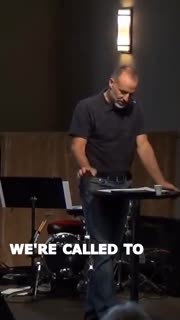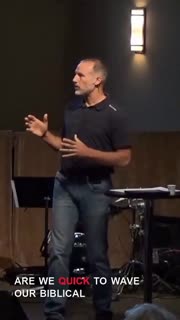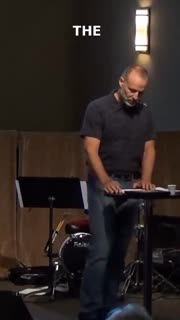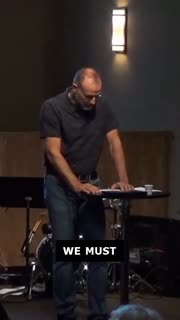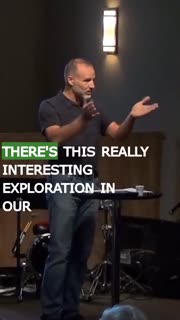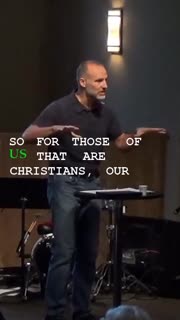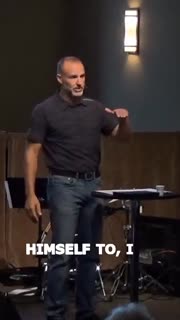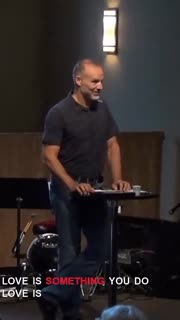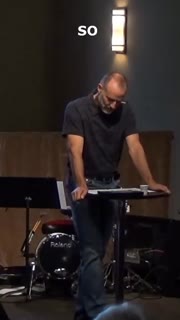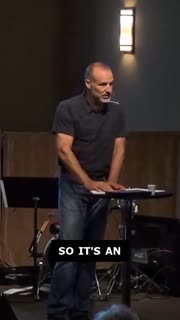Living Out Our Heavenly Citizenship with Integrity
Devotional
Sermon Summary
Bible Study Guide
Sermon Clips
1. "We're called to live now as we live out the truth that we actually are citizens of heaven where we eagerly await a Savior who's going to come. And we have to look forward into the future of what God's new creation is going to be like to inform how we should live now. So is that going to be true in heaven? Is there going to be a table for Kenyans? Is there just one table for Kenyans and then there's going to be one table for South Africans and then there's going to be a table over here for Mexicans and there's going to be a table over there for... No. So why are we at separate tables now?" [03:05] (46 seconds)
2. "Are we quick to wave our biblical morality around but avoid Christ-like behavior? And if so, if we're like, oh, yeah, biblical, biblical, biblical, but we're not living like Christ, then we sound like clanging gongs and clashing cymbals. So let's be careful about that. No, we're not just saying we've got to reform my non-Christian neighbors, you know? Let me say it this way. When the church is being watched and our character has come under question, do you believe that? Just watch the news." [04:04] (42 seconds)
3. "The church, though, can offer radically beautiful alternatives. I think it's important that we think about this. There are many. Some of you are these people. Who are crawling on your hands and knees back to the water because the world has just been a desert. It has not offered what you need. So we come to an oasis and there's a little village. Like, I don't know, Issaquah Christian Church. And it's a little family that's trying to become that for other people. And I'm here to cheer you on today. Because you are that." [05:07] (36 seconds)
4. "We must publicly stand up for broken and abused people. I mean, we heard of a situation of domestic violence that ended in death in our prayer request. We're opposed to that. Like, oh, calm yourselves down, Christians. Don't be so, you know, moralistic. Like, come on. Vulnerable people, children who are being messed with. No, we stand up. You know, if someone comes after my children, I don't just say, well, I just want to be Christ-like. Well, what's Christ-like? Protect the children. Right?" [06:41] (35 seconds)
5. "There's this really interesting exploration in our culture of we want the kingdom. We want people that respect one another and don't steal from each other and don't just walk up and punch people in the face. And we want all that. We want the kingdom of Christ without Jesus. Is that possible? And so we're in this very interesting social experiment in the West where we want the kingdom without the king. We want moral. Morals, because you can't find or found morals in materialism because it's just dog-eat-dog." [07:49] (35 seconds)
6. "So for those of us that are Christians, our allegiance is to Jesus as Lord. We've got a list of things to look at here too. And judgment begins with the church. The life that they lived, Israel was supposed to show people, wow, what a gracious and amazing God. And that is our role as well. So if we don't do that, we become a byword to the nations, those Christians. Oh, wait, they already say that. So we've got some work to do by his spirit in our lives. In a community, following him and his word." [09:28] (34 seconds)
7. "Jesus committed himself to, I want the Father's name to be more and more honored. And he's going to do it. That's the way he's going to live. And so that's what we need to live And so the way that the people see the church, the lens they put on is their responsibility. But we need to be people of integrity. And God's going to do that in and through us here." [10:56] (22 seconds)
8. "Love is something you do. Love is something you do and I think if you ask Heather about it she would probably say I just prefer he did it and then we can work on the feelings thing later whatever that is it's not a it's not if it feels right do it it's if the Lord commands that we do it and then we ask him to bring along the feelings that's right it's not just about thinking it's about actually doing it emotions are super important indicators you're kind of dashboard indicators emotions are not to be ignored sometimes they fuel the right thing sometimes they fuel the wrong thing but it's like an indicator on a dashboard but they alone aren't going to get you where you need to go they're not going to they're not going to do the work." [28:33] (56 seconds)
9. "So we've got to seek out mentors to persevere in our faith. Our faith is so important. And hopefully your leaders. And however you define that word leader, I would say in a world of social media influencers, you might have to broaden that scope. Consider the outcome of the way of their life. That podcast, that YouTuber, Instagram, whatever. Whatever that influence is that comes, consider the outcome of the way of life. Are they equipping you to do the work that you've been called to do? Because that's where God's provision comes, and that's where contentment comes, and that's beautiful." [41:15] (37 seconds)
10. "So it's an interesting thing. Obviously, we're in a culture that just says, you know, pedal to the metal. You got feelings, express them. Like, well, feelings are an interesting indicator on your dashboard, but they're not the reason, you know, you do something. They can follow sometimes. And so we don't dig inside for our feelings and then express them. We just live our lives. Okay, Jesus, what do you want? Now, it's strange to me, it might be strange to you, that sometimes he doesn't correct people. And direct people in the same order that he corrected and directed you." [47:30] (35 seconds)
Ask a question about this sermon
2. "Are we quick to wave our biblical morality around but avoid Christ-like behavior? And if so, if we're like, oh, yeah, biblical, biblical, biblical, but we're not living like Christ, then we sound like clanging gongs and clashing cymbals. So let's be careful about that. No, we're not just saying we've got to reform my non-Christian neighbors, you know? Let me say it this way. When the church is being watched and our character has come under question, do you believe that? Just watch the news." [04:04] (42 seconds)
3. "The church, though, can offer radically beautiful alternatives. I think it's important that we think about this. There are many. Some of you are these people. Who are crawling on your hands and knees back to the water because the world has just been a desert. It has not offered what you need. So we come to an oasis and there's a little village. Like, I don't know, Issaquah Christian Church. And it's a little family that's trying to become that for other people. And I'm here to cheer you on today. Because you are that." [05:07] (36 seconds)
4. "We must publicly stand up for broken and abused people. I mean, we heard of a situation of domestic violence that ended in death in our prayer request. We're opposed to that. Like, oh, calm yourselves down, Christians. Don't be so, you know, moralistic. Like, come on. Vulnerable people, children who are being messed with. No, we stand up. You know, if someone comes after my children, I don't just say, well, I just want to be Christ-like. Well, what's Christ-like? Protect the children. Right?" [06:41] (35 seconds)
5. "There's this really interesting exploration in our culture of we want the kingdom. We want people that respect one another and don't steal from each other and don't just walk up and punch people in the face. And we want all that. We want the kingdom of Christ without Jesus. Is that possible? And so we're in this very interesting social experiment in the West where we want the kingdom without the king. We want moral. Morals, because you can't find or found morals in materialism because it's just dog-eat-dog." [07:49] (35 seconds)
6. "So for those of us that are Christians, our allegiance is to Jesus as Lord. We've got a list of things to look at here too. And judgment begins with the church. The life that they lived, Israel was supposed to show people, wow, what a gracious and amazing God. And that is our role as well. So if we don't do that, we become a byword to the nations, those Christians. Oh, wait, they already say that. So we've got some work to do by his spirit in our lives. In a community, following him and his word." [09:28] (34 seconds)
7. "Jesus committed himself to, I want the Father's name to be more and more honored. And he's going to do it. That's the way he's going to live. And so that's what we need to live And so the way that the people see the church, the lens they put on is their responsibility. But we need to be people of integrity. And God's going to do that in and through us here." [10:56] (22 seconds)
8. "Love is something you do. Love is something you do and I think if you ask Heather about it she would probably say I just prefer he did it and then we can work on the feelings thing later whatever that is it's not a it's not if it feels right do it it's if the Lord commands that we do it and then we ask him to bring along the feelings that's right it's not just about thinking it's about actually doing it emotions are super important indicators you're kind of dashboard indicators emotions are not to be ignored sometimes they fuel the right thing sometimes they fuel the wrong thing but it's like an indicator on a dashboard but they alone aren't going to get you where you need to go they're not going to they're not going to do the work." [28:33] (56 seconds)
9. "So we've got to seek out mentors to persevere in our faith. Our faith is so important. And hopefully your leaders. And however you define that word leader, I would say in a world of social media influencers, you might have to broaden that scope. Consider the outcome of the way of their life. That podcast, that YouTuber, Instagram, whatever. Whatever that influence is that comes, consider the outcome of the way of life. Are they equipping you to do the work that you've been called to do? Because that's where God's provision comes, and that's where contentment comes, and that's beautiful." [41:15] (37 seconds)
10. "So it's an interesting thing. Obviously, we're in a culture that just says, you know, pedal to the metal. You got feelings, express them. Like, well, feelings are an interesting indicator on your dashboard, but they're not the reason, you know, you do something. They can follow sometimes. And so we don't dig inside for our feelings and then express them. We just live our lives. Okay, Jesus, what do you want? Now, it's strange to me, it might be strange to you, that sometimes he doesn't correct people. And direct people in the same order that he corrected and directed you." [47:30] (35 seconds)
